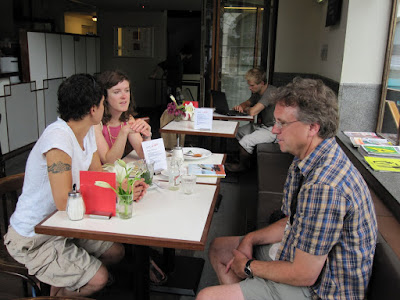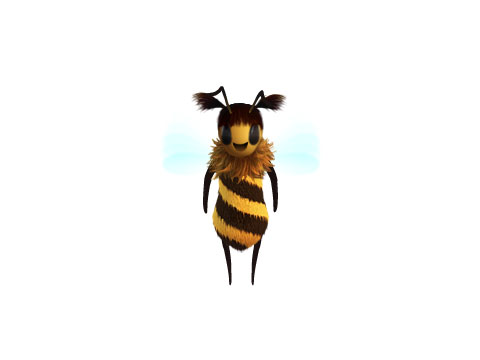
I loved Brussels instantly. If you're skeptical of my ability to love a place I don't really know, then know that I felt immediately at ease there--relaxed and strangely unalienated in a way that's difficult to feel in unfamiliar places. Bruxelles (yes, I'm going to spell it differently every other time I write it) was very familiar in many ways--it's a cosmopolitan, international, multicultural political city with a reputation for being cool but not as cool as it's close neighbors Paris and Amsterdam. I don't want to overstate the ways in which it's similar to DC, but the similarities are there.
When Mark and I arrived at Bruxelles-Midi, it was nice to actually get out and leave the station instead of waiting in it, as we had already done twice, to catch a train somewhere else. It's not a huge city (a little over one million people live there), but it's incredibly diverse. Aside from the French and Dutch speaking Belgians, there are people from all over Europe as well as north Africa, Turkey, Asia, and elsewhere. There are some estimates that about half of the people who live in Brussels are not from Belgium, and a substantial number of people who live in Bruxelles speak neither French nor Dutch as a first language. All over Bruxelles, people speak to each other in second, third or fourth languages, and it's difficult to make accurate assumptions about where people are from. I love this.
We experienced a slightly higher than normal level of disorientation when we left the station, and it wasn't clear whether we needed to catch the metro, tram or premetro to get up to our hotel in Ste-Catherine. My first encounter with a stranger in Bruxelles was indicative of all the others: I asked a woman, in French, which metro, tram or premetro we should get on, and which direction we should go. She was incredibly polite and patient and didn't switch into English or ask where I was from. Instead, she showed me on the map where we had to go, and pointed me toward the premetro station (which was, counter-intuitively, underground).

Ste. Catherine (shown above) was easy to get to, and, as it turns out, a hip place to stay--not that I knew that when I booked our hotel. I just chose that location because I didn't want to stay in one of the overpriced and touristy places on the Grand Place. The neighborhood had a nice combination of both homey and fancy bars and restaurants, as well as several Asian food markets.
In fact, the presence of Asian food markets made Ste. Catherine (and Brussels in general) seem very different from Paris, for example. In Paris, you should speak French, and if you would like to eat food that is not French, you should order it in a French way. Paris does have plenty of culturally mixed neighborhoods--but they are exactly that--specific neighborhoods, like Belleville. Aside from kabob shops, ethnic restaurants and markets in Paris don't seem to exist much outside of those specific neighborhoods. I love French food, and could gladly live on crepes, cheese and charchuterie until I died from a heart attack. Still, I felt it was significant to see such cultural variety in food in a neighborhood without any special multicultural distinction.

We met Philip Meersman and Rozalina Petrova (both shown in the very first picture) in front of the church on Ste. Catherine and walked towards Place St-Géry. Philip was one of the people who performed after Mark and I read in Ghent. I hesitate to characterize Philip's work--I wouldn't call him a sound poet, because that seems too narrow a term for the kind of diverse work he makes. While he clearly is interested in the relationship between sound, image, language and meaning (the poem he performed in Ghent was in six languages) he also works in theater and plastic arts. It's a bit cheesy of me, but I'm going to quote Mark's description of the performance, since I think it is both accurate and insightful:
Philip Meersman also performed a poem that was not technically a sound poem but that solidified my impression about the relation between sound poetry and cultural context. His poem was in six different languages, not all of which were known to any single person in the room except for him, with the result that at least some portion of his poem was only a sound poem for every member of the audience. It wasn’t meant as a display of language virtuosity, though it certainly was also that, but as a very pointed exploration of what it means to be able to understand other people or not.Even after just a few hours in Brussels, it was easy for me to see why a writer would want to work with a variety of languages. Here's a brief quote from one of Philip's poems, "La paradoja del paradero del comienzo (Una localización española)," to give you more of an idea of some of the stuff he does:
Preguntas y problemas:
Dónde está el cocheThis poem (you can read the rest of it here) makes me want to return to a project I stared ages ago working with some of the text in Practical Chinese Reader Volumes One and Two.
Dónde está mí
Dónde está me
Dónde está yo?
teoría atómica
teoría cuántica
teoría de la relatividad
teoría del caos
Dónde está la profesora
Dónde está la consejera
Dónde está el examen
The weather was wonderful, and Philip and Rozalina are both great conversationalists, so after scoring an outdoor table at a bar across from Les Halles St-Géry, we easily passed several hours talking (and drinking--in my case, a pleasantly sour geuze). Afterward, I had a notebook full of recommendations for everything from where we should eat to which chocolate shop was the best. For posterity, here is a picture of the Halles St-Géry, the point from which all distances in Belgium are measured:

Eventually, Philip and Rozalina had to head home to prepare for work as well as the huge Ghent Festival. We parted ways, and Mark and I went off to eat some very delicious Thai food. The two women sitting at the table next to us could have easily been State Department bureaucrats. They were EU bureaucrats, of course; I felt right at home. Later we wandered back towards Ste. Catherine to a local bar off the square. I don't remember the name, but the few folks in there seemed overly suprised that any tourists would be there at all. Two men sitting next to us struck up a conversation, which me more or less managed in French, Spanish and English--a pretty typical encounter in Brussels.

The next morning I went out to the original flagship location of Le Pain Quotidien, just around the corner from our hotel, for coffee and a croissant. After that, Mark and I walked over to the Grand Palace (immediately above) and farther along to the Royal Quartier and the new Musée René Magritte at the Musées royaux des Beaux-Arts de Belgique. I have an unfortunate mental block with Surrealist painters--I love how Magritte plays with the difficulty of reconciling words, images and objects, but did he have to paint so many nude women? The history of art is the history of painting nude women, I suppose, and I like Magritte enough to be frustrated with him. Still, the new museum houses the largest collection of his work that exists, including a few films. In fact, if I'd had the luxury and time to go back, I would have especially liked to spend more time with the films.
After the museum, we attempted to eat some sandwiches in the lovely Parc de Bruxelles and only barely managed. It rained, but we found shelter under some trees. Here's Mark post-lunch:

After lunch, we went back in to see the main collection of the Musées royaux des Beaux-Arts. The collections were strangely organized and difficult to navigate. For me, the highlight of this visit was Hieronymus Bosch's Temptation of St. Anthony.


After La Mort Subite, we wandered (we did a lot of wandering in Brussels) back over to the area around the Grand Palace to sit in another bar and, yes, drink another beer--they had Delirium Tremens on tap! Later, we ate dinner outside at a different but equally tasty Thai restaurant back in Ste. Catherine. It poured rather fantastically right after we finished our meal, so we took shelter at Bizon Blues--a bar that was styled like an American place even though they seemed to play mostly British rock. We enjoyed some jenever and then a Rochefort 10. The Rochefort 10 was good, but I think the 8 is still my favorite; it's just as flavorful, and less boozy.
We ended our evening at the Monk, and I really don't remember what I drank there--that's the kind of effect that a Rochefort 10 has! Still, I loved how the bartender moved in and out of different languages without even flinching. The Monk was cool, but not too cool:

Mark and I spent less time in Brussels than anywhere else on our trip, but, as I've already said, I really enjoyed my time there. Having spent much of my life as an expat, it was so comforting to be in a city where everyone spoke a different language and where, for the most part, that was ok. I could live in Brussels, and I mean that in a practical way as well as an oh-I-wish-I-wish kind of way. The weather there sucks, but I live in a place known for its great weather, and truly, if weather is the first thing that people mention about a place, you know that means that the rest of it is maybe not worth mentioning.




















